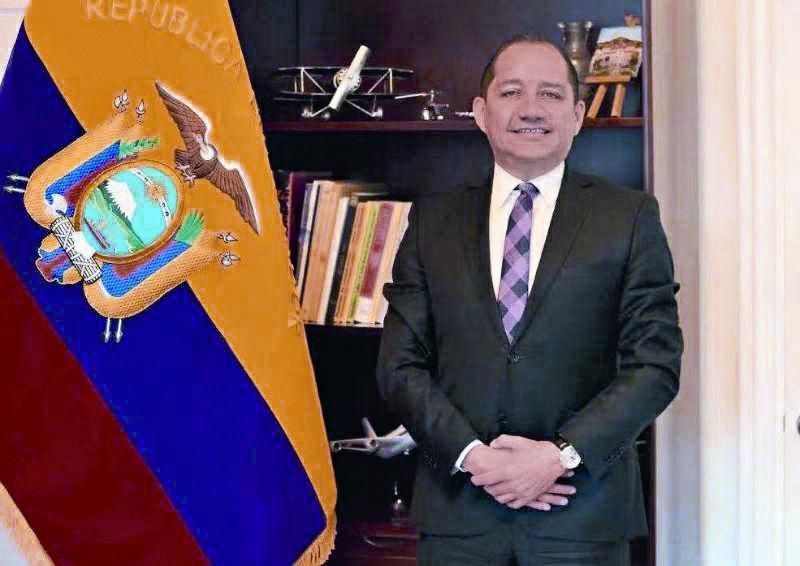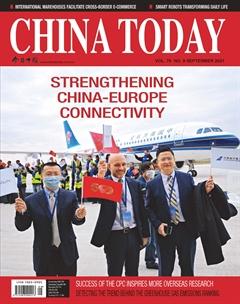Pragmatism,Closeness,and Friendship
By staff reporter MICHAEL ZáRATE

ON May 24, Guillermo Lasso assumed the presi- dency of Ecuador. One of his most important objectives is the vaccination of nine million Ecuadorians in the first 100 days of his administration, the so-called “9/100 plan,” for which the country mainly relies on the vaccine produced by the Chinese pharmaceutical company Sinovac. To achieve this and other objectives, what will be the parameters that the new Ecuadorian government will seek to establish in its relationship with China? To find out the answers to this and a range of other questions, China Today recently sat down with the Ecuadorian ambassador to China Carlos Larrea.
China Today (CT): In order to vaccinate nine million Ecuadorians, President Guillermo Lasso has written a letter to Chinese President Xi Jinping, in which he requested Xi to expand the number of vaccine doses that Ecuador could acquire. What were the details of that presidential conversation?
Carlos Larrea (CL): As soon as the results of his triumph in the elections were formalized last April, he received a letter of congratulations from President Xi Jinping. After all, his main campaign offer was to achieve the immunization of nine million people in the initial 100 days of his administration. In the congratulatory letter, Xi reaffirmed the close ties of friendship and cooperation between China and Ecuador.
This gesture was really appreciated by President Lasso, who immediately responded to the letter and recognized the importance of the bilateral relationship. He also requested the help of President Xi to substantially increase the supply of Chinese vaccines, in order to achieve this massive immunization that was in the making when President Lasso took the presidency. According to what the Chinese Foreign Ministry informed me, there was a direct decision made by President Xi to authorize the supply to Ecuador of seven million vaccines from Sinovac during the month of July.
CT: On June 11, President Lasso claimed that an agreement had also been reached with the Chinese pharmaceutical company CanSino for the purchase of six million doses of vaccine. Could you please elaborate on the situation for us?
CL: The first batch of 200,000 doses of the vaccine from CanSino for a single application arrived in Ecuador in early August to feed the immunization plan on a national scale. Another batch of 500,000 doses is expected to arrive at the end of August.
CanSino vaccines do not require two applications, like others that come from the American pharmaceutical company Pfizer, the Chinese Sinovac and the British AstraZeneca. These single doses will be used for vaccination plans in areas of difficult access, on the northern border with Peru and in the Amazon, as well as indigenous peoples of the Andean highlands and inmates of penitentiaries, among others.
CT: President Lasso is seen as a defender of free trade and open markets. How do you see the future of the relationship between China and Ecuador? What could be the role of Ecuador within the China-Latin America relationship?
CL: China knows the geopolitical weight that Ecuador could have in Latin America. In turn, Ecuador is aware of the weight that China has in the world and that it is a partner with an indisputable and unquestionable global influence. Regarding the role of Ecuador within the China-Latin America relationship, we have to associate it with President Lassos efforts to promote the ties, with his pragmatism, as he is in permanent search for consensus.
President Lasso is a liberal man. He is a man who believes in good ideas instead of ideologies. He was trained in the business sector. He has proclaimed that his government will have unrestricted respect for democratic and republican values. President Lasso advocates free trade – as you mentioned – and open markets, which translates into the slogan: “More Ecuador in the world and more world in Ecuador.” This is the concept that President Lasso wants to promote.
Our new Minister of Foreign Affairs Mauricio Montalvo is a very prestigious career diplomat. He has stated that the main asset [needed to drive Ecuadors forward momentum] is the exercise of a serious, professional, responsible foreign policy, also one with an outward and inward orientation, which is completely open, sovereign, without hinderance, and ready for open dialogue in all occasions — bilateral and multilateral.
In conclusion, the political relationship with China will be based on the parameters of pragmatism, closeness, and friendship, and therefore will be strengthened in a very significant way.
CT: We understand that the Ecuadorian Ministry of Production, Foreign Trade, Investments and Fisheries has talked of the goal of reaching trade agreements with Asia-Pacific countries, including China. Is a free trade agreement with China part of the new governments plan?
CL: The declaration that Ecuador is open to world trade, and shall reach free trade agreements with our most important allies, including the Pacific Alliance, was textually made by President Lasso himself during his inauguration speech on May 24, at the Legislative Palace in Quito.
President Lasso has stated that the decision is to fully insert ourselves in the world to seek free and fair trade. This is consistent with President Xis vision of openness. The other goal is to attract foreign investment, so we welcome Chinese investors.
Eleven years after leaving the ICSID (International Center for Settlement of Investment Disputes) convention, which is one of the most important mechanisms of international arbitration, the government of President Lasso decided to return to this system. This will help to position Ecuador on the map of international investments, including those from China.
CT: Shrimp is a key product in Ecuadorian exports to China. In light of the current pandemic, how are the safety protocols of this industry progressing?
CL: Our relationship with China is very dynamic. A few minutes ago we delivered a letter from the Minister of Commerce of Ecuador addressed to the General Administration of Customs of China. In the letter, we are pleased to inform that thanks to the fact that we have had this cooperation with China for the supply of vaccines, our private sector has supported the efforts of the Ecuadorian government to vaccinate all personnel involved in the shrimp export process. We have opted to continue increasing the biosafety, quality control and safety protocols of the shrimp industry. This is important news and also symbolizes great cooperation between the two countries.
CT: You have told us that President Lasso was one of the first heads of state to send a letter of congratulations on the 100th anniversary of the founding of the CPC. What do you think of the centennial commemoration?
CL: I had the honor of being present at the important commemoration event. That is a sign of Ecuadors respect for the CPC and Chinese people. General Secretary Xi Jinping of the CPC Central Committee has stated that China has managed to become a moderately prosperous society in all respects, which represents the achievement of the countrys first centenary goal, that is, a historic resolution to the problem of absolute poverty in this country. And now it is moving towards the second centenary goal: to turn China into a great modern socialist country in all respects.
We congratulate China on the commemoration of the CPCs centennial anniversary, today under the leadership of General Secretary Xi, whose contribution has been pervasive in the amazing achievements the country has made for the people. We express our best wishes on this very special occasion to the Chinese people for the development and prosperity of their country.

